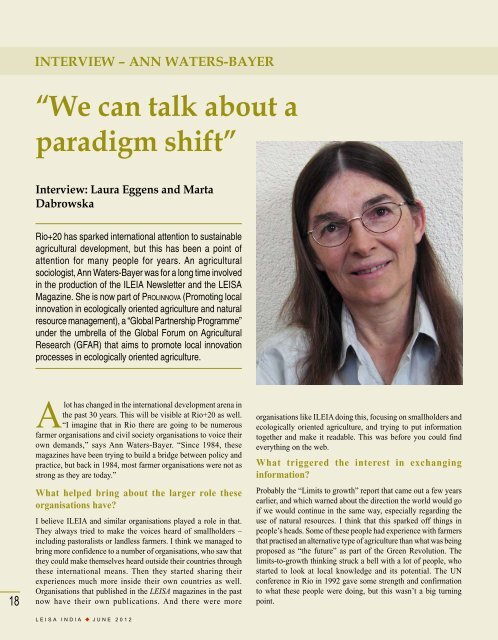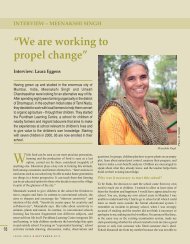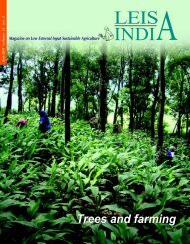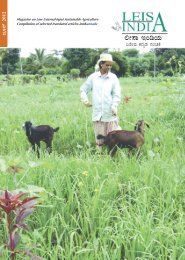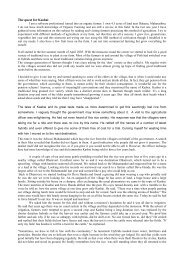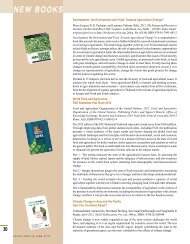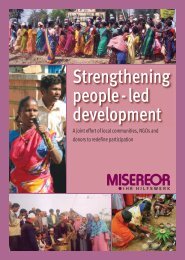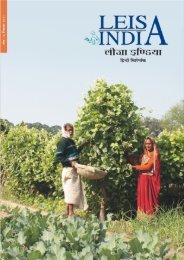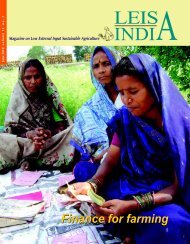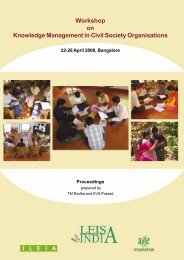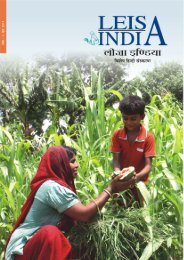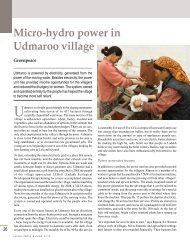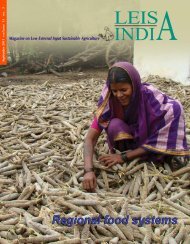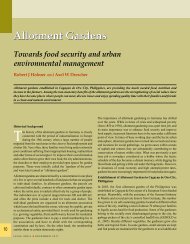âWe can talk about a paradigm shiftâ - Leisa India
âWe can talk about a paradigm shiftâ - Leisa India
âWe can talk about a paradigm shiftâ - Leisa India
- No tags were found...
You also want an ePaper? Increase the reach of your titles
YUMPU automatically turns print PDFs into web optimized ePapers that Google loves.
INTERVIEW – ANN WATERS-BAYER“We <strong>can</strong> <strong>talk</strong> <strong>about</strong> a<strong>paradigm</strong> shift”Interview: Laura Eggens and MartaDabrowskaRio+20 has sparked international attention to sustainableagricultural development, but this has been a point ofattention for many people for years. An agriculturalsociologist, Ann Waters-Bayer was for a long time involvedin the production of the ILEIA Newsletter and the LEISAMagazine. She is now part of PROLINNOVA (Promoting localinnovation in ecologically oriented agriculture and naturalresource management), a “Global Partnership Programme”under the umbrella of the Global Forum on AgriculturalResearch (GFAR) that aims to promote local innovationprocesses in ecologically oriented agriculture.18Alot has changed in the international development arena inthe past 30 years. This will be visible at Rio+20 as well.“I imagine that in Rio there are going to be numerousfarmer organisations and civil society organisations to voice theirown demands,” says Ann Waters-Bayer. “Since 1984, thesemagazines have been trying to build a bridge between policy andpractice, but back in 1984, most farmer organisations were not asstrong as they are today.”What helped bring <strong>about</strong> the larger role theseorganisations have?I believe ILEIA and similar organisations played a role in that.They always tried to make the voices heard of smallholders –including pastoralists or landless farmers. I think we managed tobring more confidence to a number of organisations, who saw thatthey could make themselves heard outside their countries throughthese international means. Then they started sharing theirexperiences much more inside their own countries as well.Organisations that published in the LEISA magazines in the pastnow have their own publications. And there were moreLEISA INDIA JUNE 2012organisations like ILEIA doing this, focusing on smallholders andecologically oriented agriculture, and trying to put informationtogether and make it readable. This was before you could findeverything on the web.What triggered the interest in exchanginginformation?Probably the “Limits to growth” report that came out a few yearsearlier, and which warned <strong>about</strong> the direction the world would goif we would continue in the same way, especially regarding theuse of natural resources. I think that this sparked off things inpeople’s heads. Some of these people had experience with farmersthat practised an alternative type of agriculture than what was beingproposed as “the future” as part of the Green Revolution. Thelimits-to-growth thinking struck a bell with a lot of people, whostarted to look at local knowledge and its potential. The UNconference in Rio in 1992 gave some strength and confirmationto what these people were doing, but this wasn’t a big turningpoint.
Many of the same warnings are coming out now. Isthere a difference?In the last couple of years we’ve seen much more attention beinggiven to ecologically oriented agriculture and to the “green aspects”of the world economy. I think that the food crisis, environmentaldamage, political uprisings, inequalities, the immense wastage offood in the North, and the climate change discussions, allcontributed to this growing interest. Some ways of agriculture aredamaging and other ways are less damaging, and are possibly moreresilient. There has been much more evidence coming up on howproductive ecologically oriented agriculture is. And in the last twoor three years, a lot of people have started to question whetherhigh-external-input intensification of agriculture is the way to go.I think that the IAASTD report played a big role as well, becausethe influential people involved in that assessment really made apoint of making the results widely known. For a lot of NGOs, herewas a multi-stakeholder process that had come to conclusions thatthey had made years before. It gave a lot of impetus to the policylobbyingwork and brought people in other organisations outsideNGOs to think <strong>about</strong> the direction in which agriculture is going.Do you think that the internet changed a lot on howpeople share knowledge?In the beginning, when we were trying to put together somethingfor a newsletter, we were working only within our network, lookingfor field-level information that was not in the double-refereedjournals. Now a lot of local knowledge on best practices is just puton the web. Of course, you still have to judge the validity of theinformation that you find. A lot of high-level policymakers willnot go around the internet to find local experiences; they needsome kind of selection and valuation. I think that institutions likeILEIA <strong>can</strong> do that by collecting, validating and analysingexperiences, and drawing out the key policy issues and findings,and making them known.Also at a local level?I think that influencing policy at a local level should be done bylocal people. There <strong>can</strong> be a role in building capacities andparticipatory research to enable practitioners and local experts togather the evidence that they need, but also in getting supportiveevidence from other sources. And then putting this together, andthinking through strategies of how to bring this to policymakers ata local level. ILEIA’s documentation workshops help localorganisations do their own lobbying by providing evidence.What is the role of PROLINNOVA in this process?PROLINNOVA is trying mainly to influence agricultural extensionand research organisations. The network wants to raise awarenesson the capacities that farmers have to develop their owntechnologies, systems and institutions, which they have been doingfor ages. Research and extension activities <strong>can</strong> build on thoseexisting initiatives. We would like to link much more withsmallholder agriculture movements. All too often, statements <strong>about</strong>agriculture <strong>talk</strong> <strong>about</strong> the type of agriculture that should bepromoted, but not <strong>about</strong> how it should be promoted. At the sametime, I am amazed at how much more verbal attention is given tolocal innovation and supporting local initiatives, at least on paper.Even though the support for transfer-of-technology approachesdid not disappear overnight, some documents do recognise theimportance of local initiatives. This is a different approach.Do you have any hope that Rio+20, or the changingattitudes, will lead to changes in policies?I don’t like to put all of my cards on one event, but I think that anevent like Rio+20 <strong>can</strong> make a big contribution. It allows variousmovements to come together. You <strong>can</strong> always use Rio+20 to getyour message across, not only to people that are involved in theactual event, but also around the world. Supposedly, a lot offinancial support will be made available now. But we have to makesure that the right message is heard. People should also see whathas been happening for decades on the margins. Internationalorganisations, like FAO, the World Bank or the bilateral andmultilateral donors, are now supporting more ecologically orientedagricultural programmes, so we <strong>can</strong> <strong>talk</strong> <strong>about</strong> a <strong>paradigm</strong> shift inthese organisations. But there is a very large group of smallholderfarmers and supporting organisations that have been thinking likethis for decades!LEISA INDIA JUNE 201219


